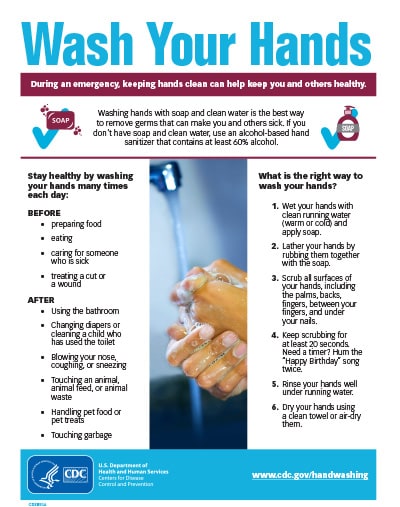Personal Hygiene During an Emergency
Good personal hygiene and handwashing are critical to help prevent the spread of illness and disease. Sanitation and hygiene become especially important during an emergency, such as a natural disaster, when finding clean, safe water could be difficult.
Learn about important cleanliness tips to keep yourself and loved ones healthy during an emergency.
Wash your hands to prevent the spread of germs
Keep hands clean to help prevent the spread of germs. During a boil water advisory or do not drink water advisory, it may be safe to wash hands with tap water. If local authorities or your doctor recommend extra caution, wash your hands with soap and water that has been boiled or disinfected.
- Wash your hands with soap and water for at least 20 seconds, especially during key times when you are most likely to spread germs. Follow CDC’s five easy steps to make sure you are washing your hands the right way.
- If clean tap water is not available, create a temporary handwashing station [PDF-38 KB] by using a large water jug.
- If you do not have soap and water use an alcohol-based hand sanitizer that contains at least 60% alcohol.

English [PDF – 1 page] (8.5×11)
Chinese [PDF – 1 page] (8.5×11)
Hawaiian [PDF – 1 page] (8.5×11)
Japanese [PDF – 1 page] (8.5×11)
Korean [PDF – 1 page] (8.5×11)
Ilocano [PDF – 1 page] (8.5×11)
Spanish [PDF – 1 page] (8.5×11)
Tagalog [PDF – 1 page] (8.5×11)
Vietnamese [PDF – 1 page] (8.5×11)
Alcohol-based hand sanitizers can quickly reduce the number of germs on hands in some situations, but sanitizers do not eliminate all types of germs and might not remove harmful chemicals. Hand sanitizers are not as effective when hands are visibly dirty or greasy.
Follow local guidance on water that is safe for bathing
If you are on municipal water, listen to your local health and drinking water authorities for guidance on whether you can bathe or shower after a water-related emergency. Sometimes water that is not safe to drink can be used for bathing, but be careful not to swallow any water or get it in your eyes.
Do not bathe:
- In water that may be contaminated with sewage or toxic chemicals.
- In rivers, streams, or lakes that are contaminated by flood water, human sewage, or animal waste.
If you have a drinking water well, listen to your local health authorities for advice on using well water for showering and bathing. If extensive flooding has occurred or you suspect your well may be contaminated, contact your local, state, or tribal health department for specific advice on well testing and disinfection.
Use only clean water to brush your teeth
Use only clean water to brush your teeth after a water-related emergency. Listen to local authorities to find out if tap water is safe to use.
- Visit the Preparing a Home Water Supply page for more information about making your water safe for brushing your teeth.
- Find complete information on caring for your teeth on CDC’s Oral Health website.
Keep wounds clean and covered
Keeping wounds clean and covered is crucial during an emergency. Open wounds and rashes that have been exposed to contaminated water can become infected. Naturally occurring bacteria such as Vibrio that live in certain coastal waters can also cause a skin infection when an open wound is exposed to salt water or brackish water, a mix of salt and fresh water often found where rivers meet the sea.
To protect yourself and your family:
- Avoid contact with flood waters, salt water, or brackish water if you have an open wound (including cuts and scrapes).
- Keep open wounds as clean as possible by washing well with soap and clean water.
- Cover clean, open wounds with a waterproof bandage to reduce your chance of infection.
- Seek immediate medical care if a wound develops redness, swelling, or oozing.
Healthcare professionals should visit Emergency Wound Management for Healthcare Professionals and Guidance for Management of Wound Infections.
Follow guidelines for safe diapering
It’s always important to change diapers in a safe, germ-free way, but an emergency can make this difficult. Even a microscopic amount of poop can contain millions of germs. CDC has developed guidelines and checklists to help parents, childcare providers, emergency responders, and others learn how to practice safe and germ-free diaper changing in emergency situations.
- Handwashing: Clean Hands Save Lives
- Make a Handwashing Solution For Use in Global, Low-Resource Settings
- Cleaning and Sanitizing With Bleach after an Emergency
- Diapering in the Home or Childcare Facility (Non-emergency)
- Disaster Resources
- Flood Water After a Disaster or Emergency
- Guidelines for the Management of Acute Diarrhea After a Disaster
